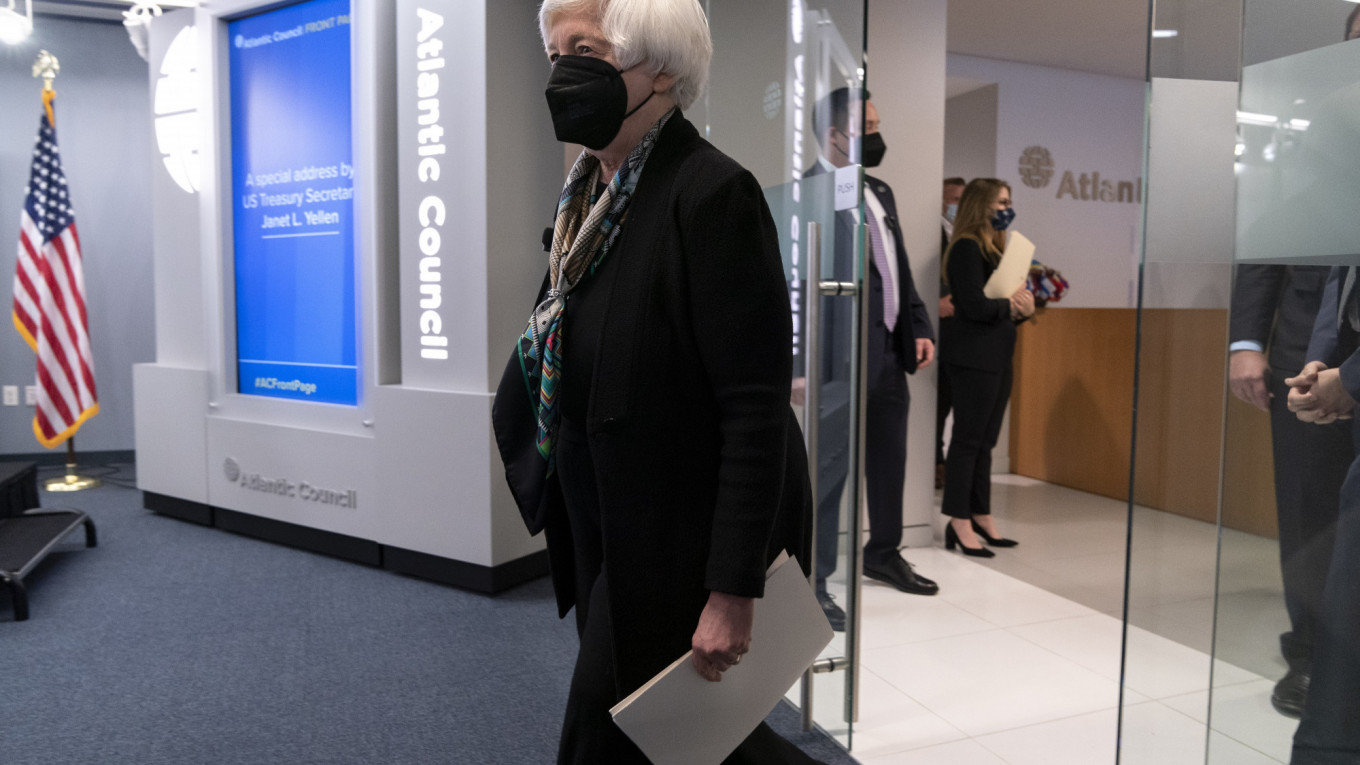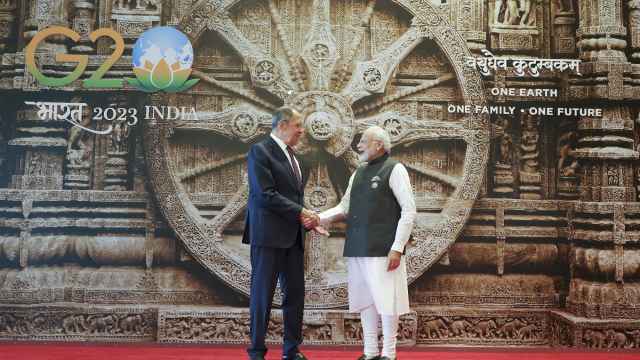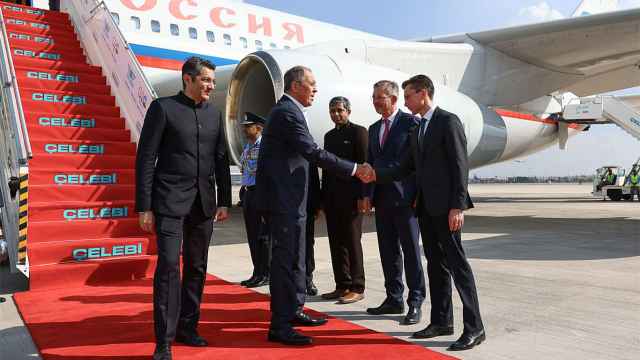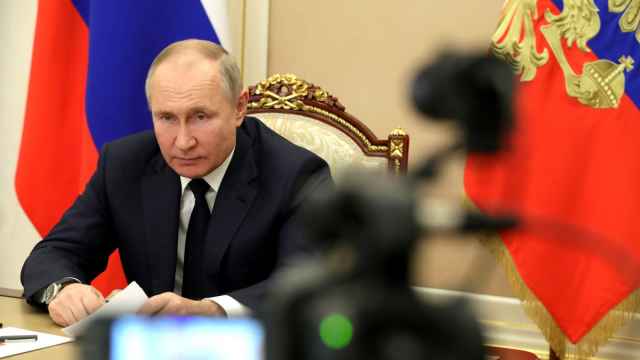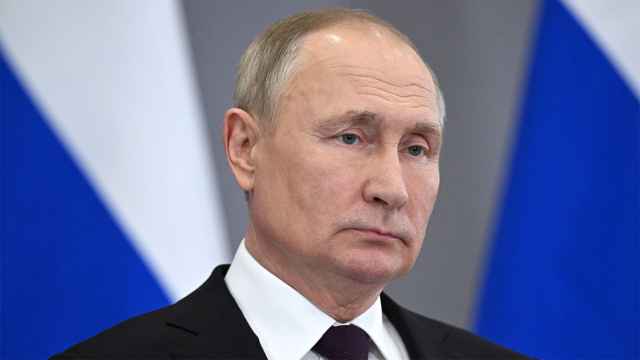U.S. Treasury Secretary Janet Yellen led a multinational group of finance chiefs on a walkout Wednesday as Russian officials spoke during a meeting of the G20, in the latest protest by Western nations over Moscow's invasion of Ukraine.
Russia's attack on its neighbor loomed over the meeting of finance ministers and central bank governors from the world's most developed countries, the first since President Vladimir Putin ordered the invasion in late February.
British and Canadian officials also took part in the boycott, officials confirmed, underscoring the boiling tensions at the gathering convened to address global challenges like rising debt and a possible food crisis.
"Multiple finance ministers and central bank governors including Ukraine Finance Minister [Sergiy Marchenko] and Secretary Yellen walked out when Russia started talking at the G20 meeting," a source familiar with the event told AFP.
"Some finance ministers and central bank governors who were virtual turned their cameras off when Russia spoke."
Canadian Deputy Prime Minister Chrystia Freeland tweeted a photograph of the officials who left the meeting, saying, "The world's democracies will not stand idly by in the face of continued Russian aggression and war crimes."
During the gathering, French Finance Minister Bruno Le Maire called on Russian delegates to refrain from attending the sessions, saying "war is not compatible with international cooperation."
The Group of 20, chaired by Indonesia this year, includes major economies like the United States, China, India, Brazil, Japan and several countries in Europe, including Russia.
'Very important forum'
Indonesian Finance Minister Sri Mulyani Indrawati, who led the meeting said, the walkout was done "without disrupting... our discussion" on the substance of the agenda.
"All members see the G20 as a very important forum," she told reporters. "So I'm confident that this will not erode the cooperation as well as the role of the G20."
Prior to the meeting, German Finance Minister Christian Lindner said the country, which chairs the G7 group of liberal democracies, would try to find common ground, but ruled out providing "a stage for Russia to spread propaganda and lies." He did not join the walkout.
Russian Finance Minister Anton Siluanov attended the meeting virtually, and "called on the partners to avoid politicizing the dialogue and stressed that the G20 has always been and remains primarily an economic format," his ministry said in a statement.
The finance officials are gathering on the sidelines of the World Bank and IMF's spring meetings in Washington.
Despite the friction, IMF Managing Director Kristalina Georgieva said global cooperation "must and will continue," pointing to multiple issues that "no country can solve on its own."
Georgieva, who heads an institution with 189 members, told reporters, "I can vouch for the fact that it is more difficult when there are tensions, but it is not impossible."
Debt woes
The meetings in Washington are focused on how to help the global economy recover from the new shock caused by Russia's invasion, which has driven prices for food and fuel higher and caused the IMF to lower its global growth outlook to 3.6% for this year.
Western nations have retaliated for the bloody incursion with sanctions meant to harm Russia's economy and turn it into a pariah state.
U.S. President Joe Biden has proposed ejecting Russia from the G20.
But Mark Sobel, a former Treasury official who is now U.S. chairman of the Official Monetary and Financial Institutions Forum, told AFP there was no obvious mechanism for booting Moscow, which is to varying degrees supported by China and India.
"I think that it really does raise a fundamental question about how are you going to manage global governance," he said of the tensions.
The divide also bodes ill for the G20 Common Framework created during the pandemic to help heavily indebted countries find a path to restructure their obligations, which Sobel said is "flailing" as China and private-sector creditors drag their feet on participating.
A Message from The Moscow Times:
Dear readers,
We are facing unprecedented challenges. Russia's Prosecutor General's Office has designated The Moscow Times as an "undesirable" organization, criminalizing our work and putting our staff at risk of prosecution. This follows our earlier unjust labeling as a "foreign agent."
These actions are direct attempts to silence independent journalism in Russia. The authorities claim our work "discredits the decisions of the Russian leadership." We see things differently: we strive to provide accurate, unbiased reporting on Russia.
We, the journalists of The Moscow Times, refuse to be silenced. But to continue our work, we need your help.
Your support, no matter how small, makes a world of difference. If you can, please support us monthly starting from just $2. It's quick to set up, and every contribution makes a significant impact.
By supporting The Moscow Times, you're defending open, independent journalism in the face of repression. Thank you for standing with us.
Remind me later.


